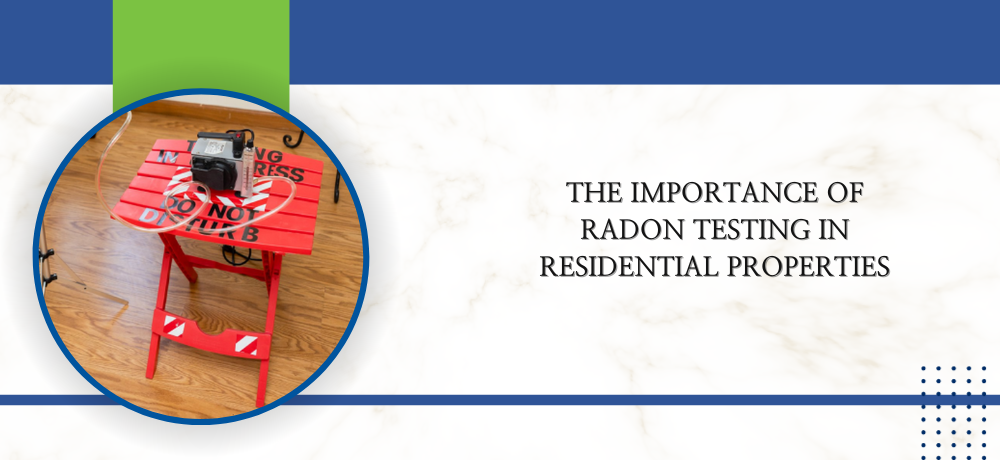
The Importance of Radon Testing in Residential Properties
- Summit Property Inspectors
Radon is a silent threat that can affect the air quality in residential properties, posing serious health risks. In the realm of home safety, there are countless concerns that conscientious homeowners must navigate, from securing sturdy locks to installing smoke detectors. However, amidst these visible safeguards, there exists a silent, invisible threat that often goes unnoticed - radon gas. While it may not be as familiar as other household hazards, radon is a potent danger that demands our attention.
Radon, a colorless and odorless radioactive gas, emerges from the natural decay of uranium in soil, rock, and water. It can seep into homes through cracks and openings in the foundation, posing a significant health risk to those who unknowingly breathe it in. The World Health Organization (WHO) has classified radon as a Group 1 carcinogen, placing it in the same category as tobacco smoke and asbestos.
In this blog, we'll delve into the reasons why radon testing is an indispensable aspect of residential property management. From understanding the health implications to exploring detection methods and mitigation strategies, we aim to empower homeowners with the knowledge needed to safeguard their homes and loved ones from this silent intruder.In this blog, we'll delve into the importance of radon testing, why it's a crucial step in property inspection, and how addressing radon concerns can create a safer living environment for homeowners.
Health Risks Associated with Radon Exposure in Residential Properties:
Radon, a radioactive gas resulting from uranium decay in soil and rock, poses significant health risks, particularly when elevated levels are present in residential properties. Given its colorless and odorless nature, radon often goes unnoticed, making regular radon testing imperative. Prolonged exposure to this gas has been conclusively linked to an increased risk of lung cancer, especially among non-smokers. Considering that individuals spend a substantial amount of time indoors, particularly in their homes, understanding and mitigating potential health hazards associated with radon gas becomes crucial for safeguarding the well-being of residents.
Varied Radon Levels and the Importance of Residential Testing:
Radon levels can significantly vary based on geographic location, soil composition, and home construction. Even in regions with an overall low radon risk, individual homes may exhibit elevated concentrations. Residential properties can be susceptible to radon infiltration through cracks in foundations, gaps in walls, and other openings. Therefore, periodic radon testing is essential to assess the specific radon levels in a particular residence, ensuring that appropriate measures can be taken to address any issues promptly.
Regulatory Compliance and Radon Testing in Real Estate Transactions:
Recognizing the potential health risks, many regions have implemented regulations mandating radon testing in residential properties. Compliance with these regulations is not only a matter of public health but also plays a crucial role in real estate transactions. In some cases, radon testing is a mandatory component of property transactions, with prospective buyers often requesting test results as part of their due diligence. Thus, the importance of radon testing extends beyond health considerations, encompassing regulatory compliance and the facilitation of transparent real estate transactions.
Effective Mitigation Strategies for Residential Radon Issues:
In the event that radon testing reveals elevated levels in a residential property, it opens the door to implementing effective mitigation measures. Various radon mitigation systems, such as sub-slab depressurization and ventilation, have successfully reduced radon levels and minimized associated health risks. Identifying and addressing radon issues early through testing not only enhances the safety of the living environment but also presents an opportunity to proactively implement mitigation strategies, preventing prolonged exposure and potential health concerns.
Long-Term Financial Considerations and the Value of Radon Testing:
While there may be upfront costs associated with radon testing and mitigation, the long-term financial benefits cannot be overstated. Investing in radon testing and mitigation contributes to creating a safer living environment and safeguards property values. Undisclosed radon issues can have a significant impact on property values and may result in unforeseen healthcare expenses. By proactively addressing radon concerns through testing and mitigation, homeowners prioritize the well-being of their families and make a prudent investment in the long-term value of their residential properties.
Radon testing is a vital component of residential property inspection, with far-reaching implications for the health and safety of homeowners. By understanding the nature of radon, its health risks, testing methods, mitigation strategies, and regulatory compliance, homeowners can take proactive steps to create a radon-free living environment.
Get in touch with Summit Property Inspectors today! To learn more about what we do, please click here. To contact us, please click here or call us at (718) 720-5512.
